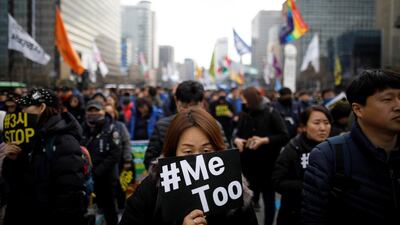The latest term you need to add to your lexicon is "upskirting", the vile phenomenon of men using their mobile phone cameras to surreptitiously take photos up the skirts of women in public. Yes, it’s as disgusting and perverted as it sounds.
The subject has hit the news in the UK after new legislation was proposed to criminalise this disturbing act. Shockingly, there is currently nothing the UK police can do if someone is found to be upskirting.
Of course the violation of upskirting is immense, not to mention the potential circulation of such highly intimate images. But UK law permits photos of anything in public – and upskirting victims are in a public space. In addition, since no one else is affected by the photo, it is not considered an offence of "public nuisance". And because she is outside her own home, that is to say not in her private domain in physical terms, upskirting is not considered voyeurism.
Private space has always been defined physically. But the appalling phenomemon of upskirting, and the way that laws around physical boundaries fail to give women basic protections, should push us to re-think how we define the private sphere.
In fact, I would argue that redefining the private space, to relate it to the person rather than the physical environment, ought to become one of the most pressing issues for women’s rights.
The issue of space and bodily autonomy is important and urgent. Establishing the boundaries of female privacy with physical walls has not always provided the intended protection, nor the full and safe participation in public life that women – and society – deserve. But most of all the boundaries do not give women their due respect.
This has been brutally transparent in many of the male responses to the #MeToo movement. They asked why women don't have a sense of humour or an enjoyment of the good old fashioned banter. Men said they will need to be taught about the boundaries of respectful behaviour, as though they were animals in need of house-training.
We often see something similar in the responses to women in some traditionalist countries and societies when they emerge into the public space. Women are abused and bullied, told if they are attacked that they were asking for it by being in the public space.
___________________________
Read more from Shelina Janmohamed:
The world can be a frightening place, but don't lose sight of your hope this Eid
Grenfell Tower is a monument to the tragic inequalities of modern Britain
Denying the discrimination of British Muslims is its own twisted form of Islamophobia
___________________________
In some places women are not permitted at all in some public spaces or are forced to anonymise themselves. Often they are ejected with the argument that they need to be in a physically private space.
Women then try to reclaim the public space for themselves, but are always told they need to be vigilant about those who seek to exclude or intimidate them. Many men feel they have rights over women in the public sphere and there is often no legal redress allowing women to push back.
But when we redefine privacy as belonging to the person, not the physical space, then these prohibitions and threats melt away.
Personally I feel it first hand as a woman in the West who wears the hijab. One of the most common arguments made by men for women removing their niqabs is based on a demand to see hair, as if they have a right to the hair, faces and bodies of women.
It is a demand often made of women in public, when as women we should have the right to draw our own privacy boundaries. It’s really not much of a leap to the entitlement that leads men to cross the boundaries into upskirting.
In too many places, a woman’s body is seen as public property. So when women are in public, we need a new mechanism to extend the private sphere and protect them.
While laws prohibiting disgusting acts like upskirting, and other infringements of a woman's body and respect, are needed, what we really need to address is the enduring question of what public and private space is. Indeed we need to rethink it beyond physical walls, and apply it to the person.
Ultimately we carry our private space with us. And the law, as well as social norms, should focus on protecting that.
Shelina Janmohamed is the author of Love in a Headscarf and Generation M: Young Muslims Changing the World


